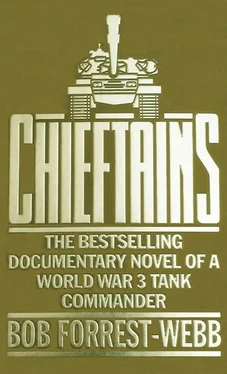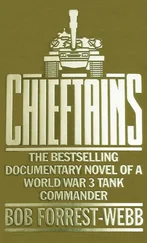Davis was brooding over an uncomfortable feeling; more than simply a premonition. Outwardly, this military exercise was little different from many others. There had been the usual theatrically urgent orders and then the deployment to the pre-determined battle stations. The same sort of thing happened frequently, and was designed to keep the army on its toes whilst at the same time acting as a reminder to the Warsaw Pact countries of the readines of the NATO forces. Whenever there was a worsening of East-West relationships, there was a great stirring amongst the opposing armies as each rippled its muscles as a warning to the other. But this time? For months there had been talk of a dangerous change in the balance of power in Europe; the USSR had taken advantage of the recession in the west in the early 1980s to build up their own armies regardless of the cost to their people. Western governments had not responded quickly enough and Russian military superiority had reached the critical level. The scales were heavily balanced in favour of the USSR and, if it failed to act soon, its leaders surely knew there might never be quite so ripe an opportunity.
The strikes and workers’ discontent in Poland in 1980 had diminished during the next two years when some of the people’s demands had been met by their government and the strikers’ enthusiasm cooled by the threats of Russian intervention, but in 1984 the problems had flared again, and then boiled over into Hungary, East Germany and Czechoslovakia. Davis wasn’t interested in politics, only their outcome; but the incursion by Soviet forces into Yugoslavia less than a week before had brought an instant reaction from the United States. Part of their Mediterranean fleet was already in the Adriatic, and they were supplying arms and equipment to the Yugoslav army now fighting the invaders in central Serbia. Davis had lived with the threat of war throughout all his fourteen years of military service, but he knew it was closer tonight than it had ever been before.
It was possible that even the evacuation of families was part of some training scheme, but coupled with the manner in which the regiment’s tanks had been brought into the border area in darkness under their own power instead of on transports, it was all too close to the real thing for Davis’s peace of mind. The map reference of his present position seemed to confirm his thoughts.
A hundred times before, the regiment had been alerted and ordered to some obscure theoretical battle position; sometimes as far to the west as the Rhine. The alerts were part of the training, exercise scenarios conceived by the intelligence officers who plotted most of the schemes. The fifty-two-ton Chieftains were driven from their ranks in the vehicle parks or sheds, loaded on to transporters to protect the German road surfaces from the ravaging steel tracks, and taken to some piece of ground where they could be offloaded to roar and crush their way to the fire-points.
This time it had all been different.
Davis had been to this battle position only once before… three years previously, and then not in a tank but as a passenger with his former troop leader in an armoured personnel carrier. Because of lack of vision available to the passengers inside the APC it had been difficult to follow its route, and when it had stopped it was in an overgrown track cut through birch forest. The party had consisted of the squadron leader, troop leaders and their sergeants. The squadron leader had taken them a few hundred meters deeper into the woodland on foot. Davis had been surprised to find carefully constructed fire-points hidden amongst the trees, each excavated to take a tank, hull-down, with just enough of the vehicle above ground to permit the gunner to use his sights and depress the gun its full ten degrees if necessary.
‘Satisfied, Lieutenant?’ Davis had overheard the major question a troop leader.
The lieutenant stared down across the long easy slope towards the frontier. The ridge commanded a broad open section of the plain between two small hamlets. A stream only visible through binoculars and little more than six meters in width defied the distant border, meandering its way between East and West Northwards was rich flat farmland, interposed with bands of young pine forests. ‘It’s a good position, sir.’
‘The best we have, gentlemen,’ said the squadron leader to the group of men. ‘I pray to God we, never have to use it.’ The officer had spent the next hour discussing the features of the terrain and how they could best be used in the event of a Soviet attack. Davis had heard the map reference mentioned during the return trip to the barracks. His mind had grasped it immediately, filed it away for the future. And the future had become the present. Not once in all the many exercises in which Sergeant Davis had taken part had the hidden fire-points ever been used… until now!
The Field Headquarters of the 1st Battle Group, British 4th Armoured Division, were two Sultans, modified as command vehicles and situated almost a mile to the west and rear of the regiment’s battle positions on the eastern slope of the Grosses Moor. The FV 105s, slab-sided and wedge-nosed, had only single 7.62 machine guns for armament and relied on the regiment’s armour for protection. They were parked tight beneath the pine trees, the overhanging branches assisting the camouflage netting which draped the hulls. Two Chieftains were at rest nearby, one belonging to Lieutenant Colonel James Studley, the other to Major Fairly, the regimental second in command. A third command Sultan, normally used by the second in command and the operations officer, was sited eight kilometers to the rear with the Headquarters Squadron.
Between the Field Headquarters’ Sultans and the regiment’s forward armour were a company of mechanized infantry; to the rear, the battle group’s two batteries of Abbot 105mm self-propelled guns. On the lower ground of the Elm, where it bordered the plain, six FV-438s fitted with launchers for the Swingfire ATGW missiles were concealed amongst a plantation of immature pines.
The interior of the commander’s APC was crowded. Much of its available space was taken up by its two map boards and the radio equipment. Its small penthouse at the rear of the vehicle had been erected and gave a little more working room to the command staff, but even so it was almost impossible to move without jostling someone.
For the hundredth time in the past three hours, Lieutenant Colonel James Studley stared down at the large scale map in front of him, as though its constant detailed perusal might uncover some hidden aspect of the Soviet battle plans. His action was little more than nervous habit; he knew the area as intimately as the Sussex village where his family had lived since his childhood. Knowledge of the terrain was one of the strengths of the NATO armies.
He also knew the positions of the other battle groups of the armoured division. They were all part of the plan, carefully deliberated, debated and practised over all the past years, and soon to be tested. He understood its place in the overall scheme of the defence of Western Europe, although the fullest details remained, for obvious reasons of security, in the hands of the operations staff in Northern Army Group Headquarters.
Flexible defence! He thought it almost Buddhist in principle. Bend like a reed before a gale, against a strong attack give way; but with increasing force turn the enemy in the direction you choose. Lead him unsuspecting to the cunningly prepared traps, the killing zones. And the killing zone for CENTAG was Hannover.
Intelligence indicated that a major enemy thrust was likely to be made at the point where the areas of responsibility of the German and British corps overlapped. Secretly, Studley disagreed. If he were a Russian general, he would base his attack along the highway system from Magdeburg, knowing full well that the NATO powers could not fire a single shot in his direction until the spearhead of his heavy assault armour had crossed the border into their territory — by which time it would have gained too much momentum to be halted.
Читать дальше












